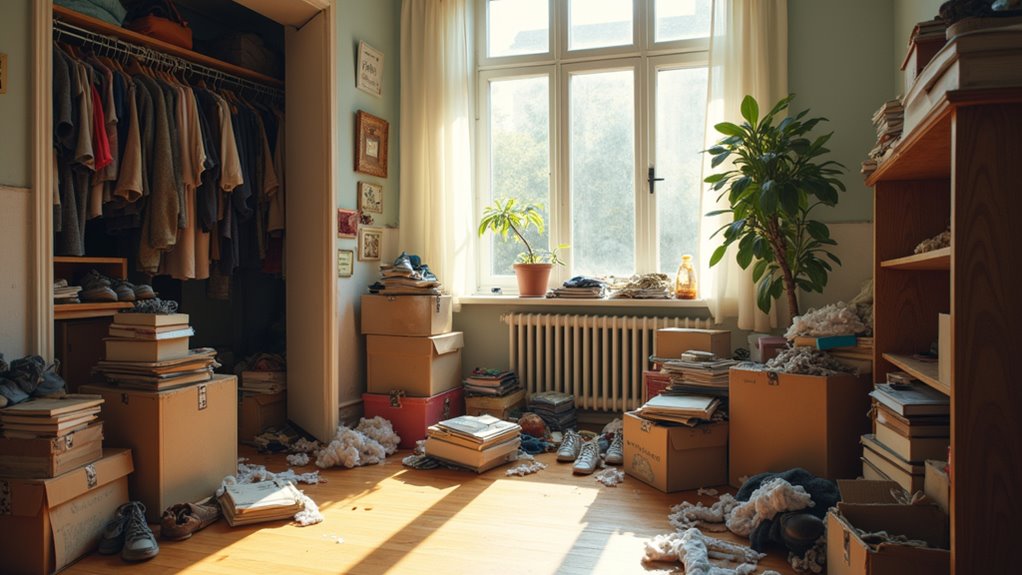These decluttering mistakes can really stall your progress. Without a clear plan or specific goals, you might end up feeling overwhelmed and stuck. Holding onto sentimental clutter and rushing through decisions only adds to the chaos. Plus, using inefficient sorting methods and procrastinating can lead to dissatisfaction. Don't forget to maintain your space with checklists and regular reviews to stay organized. Want to identify more pitfalls and improve your decluttering journey? There's more to explore!
Key Takeaways
- Lack of clear objectives leads to aimlessness, making it difficult to measure progress and maintain motivation during decluttering.
- Procrastination is often fueled by vague goals, resulting in overwhelming feelings and increased clutter.
- Inefficient sorting methods can create chaos and frustration, hindering effective decision-making and prolonging the decluttering process.
- Disorganization, such as not using checklists, can lead to confusion and wasted time on unimportant tasks during decluttering efforts.
- Emotional attachment to items complicates the decluttering process, causing guilt and hindering the ability to let go of unnecessary belongings.
Lack of a Clear Plan

When you dive into decluttering without a clear plan, you risk making the process inefficient and overwhelming. Without specific goals, you may find clutter spreading around, leaving you feeling unaccomplished and burnt out. To avoid this, establish realistic objectives that keep you focused and on track. Create a checklist of areas to tackle, setting measurable targets for each space. Dedicate time for decluttering sessions and break large tasks into manageable steps. Setting realistic and specific decluttering goals is essential to ensure you're making progress.
Incorporating mindfulness techniques during your decluttering process can also help enhance focus and reduce stress. Regularly review your progress and adjust your plan as needed. Planning enhances efficiency, reduces stress, and helps you maintain motivation. By having a clear vision, you'll see visible results, making the decluttering journey more satisfying.
Don't skip the planning; it's crucial for success!
Holding on to Sentimental Clutter

Without a clear plan, you might find yourself overwhelmed by clutter, but even with a strategy, letting go of sentimental items poses its own challenges. Emotional attachment can make it tough to part with items tied to cherished memories. You might fear losing those memories or feel guilt about discarding gifts from loved ones, which hinders your decluttering efforts. Instead of holding onto everything, consider documenting the stories behind these items or taking photos to preserve the memories without the physical clutter. Creating a memory box for a few select pieces can also help. Building strength to let go can empower you to gradually part with even your most cherished items.
Inefficient Sorting Methods
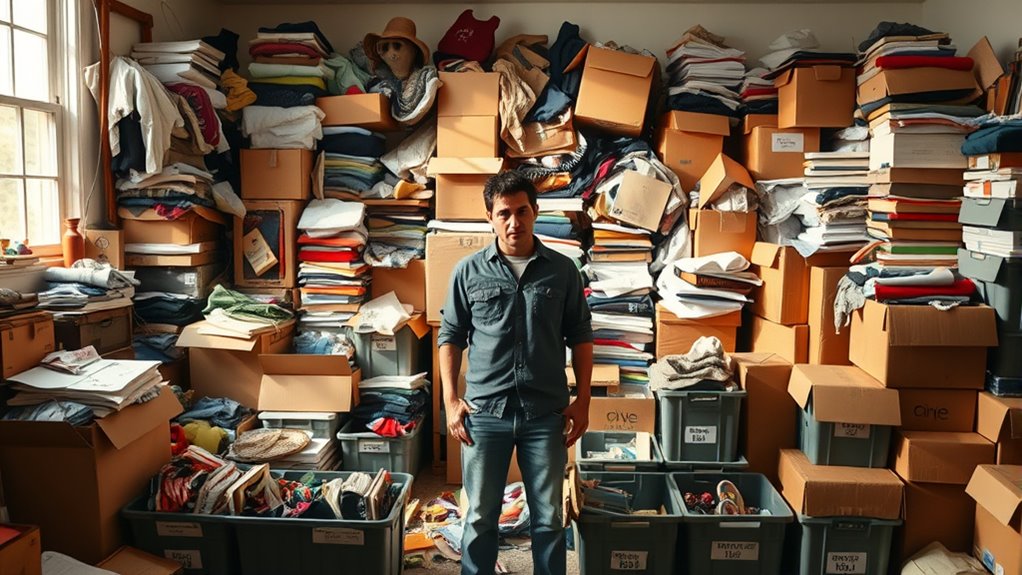
Inefficient sorting methods can derail your decluttering efforts, leaving you feeling frustrated and overwhelmed. Without a clear plan, you may rush through decisions, resulting in regret later. Not using the right tools, like bins or boxes, can hinder your progress, making the process chaotic.
If you switch sorting methods mid-task, confusion can set in, derailing your focus. Concentrating on one area at a time is crucial; scatterbrained sorting leads to incomplete tasks. Remember to involve all household members, ensuring everyone contributes. Additionally, adopting a thoughtful approach to decluttering allows for better decision-making and reduces feelings of overwhelm during the process. Utilizing vertical storage solutions can also help in organizing your items more effectively, providing a sense of order.
Ignoring the 'one in, one out' rule can cause clutter to creep back in, defeating your efforts. By addressing these mistakes, you can streamline your sorting process and maintain a clutter-free space.
Procrastination and Its Effects
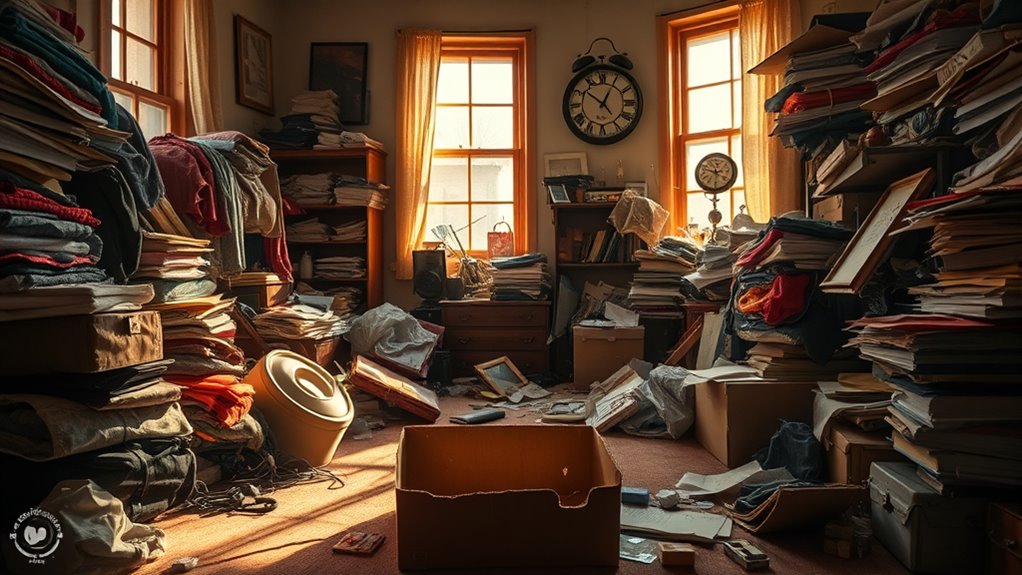
Procrastination can sneak up on you, transforming the simple act of decluttering into an overwhelming challenge. It creates a frustrating cycle, making the clutter build up and your spaces more disorganized, which can take a toll on your mental health. When you avoid starting, you fuel that feeling of overwhelm. To break this cycle, understand your procrastination patterns and tackle tasks in smaller steps. This approach reduces resistance and makes decluttering manageable. Remember, tracking procrastination urges leads to inefficiency and haphazard efforts, so create a clear strategy to guide you. Regular, short decluttering sessions can maintain your momentum, helping you stay motivated and on track. Additionally, maintaining hydration levels is crucial as it aids in cognitive function, allowing you to stay focused during your decluttering process.
Rushing Through the Process
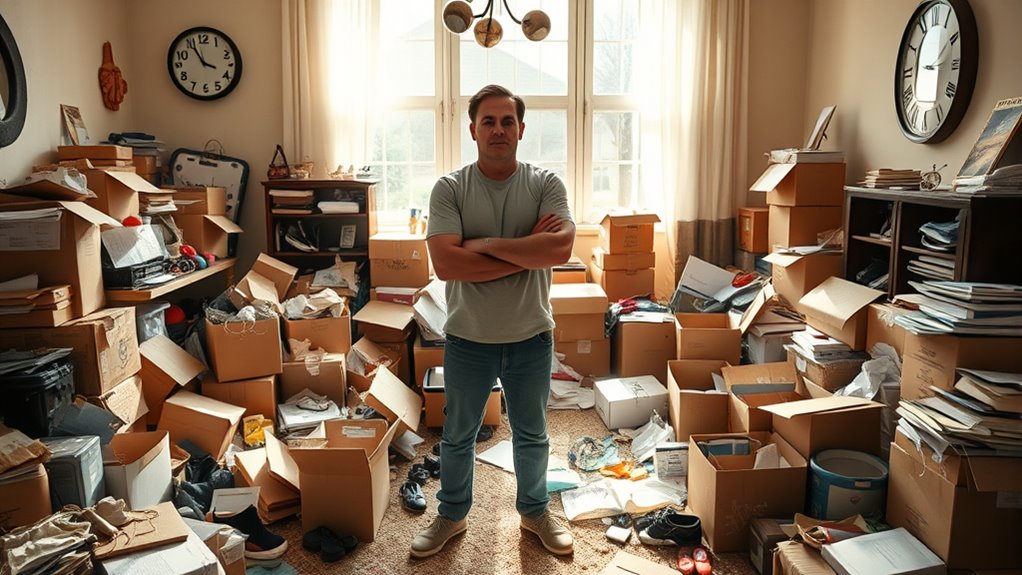
When you rush through the decluttering process, you might think you're saving time, but the reality is often quite the opposite. Speeding through can lead to emotional overload as you hastily handle sentimental items, leaving you feeling guilty and overwhelmed.
You may end up sorting poorly, missing opportunities to donate or recycle valuable items. This rush elevates stress levels, triggering cortisol release that exacerbates anxiety. Additionally, without considering the emotional aspect of decluttering, you risk missing the psychological benefits that come from a more mindful approach.
Moreover, without taking the time to reflect on your consumption habits, you risk repeating past mistakes. Logistical challenges, physical fatigue, and wasted resources often follow, making the entire process less sustainable.
Ultimately, a hurried declutter can diminish the long-term mental health benefits you seek. Slow down and embrace a more thoughtful approach.
Premature Organization Strategies
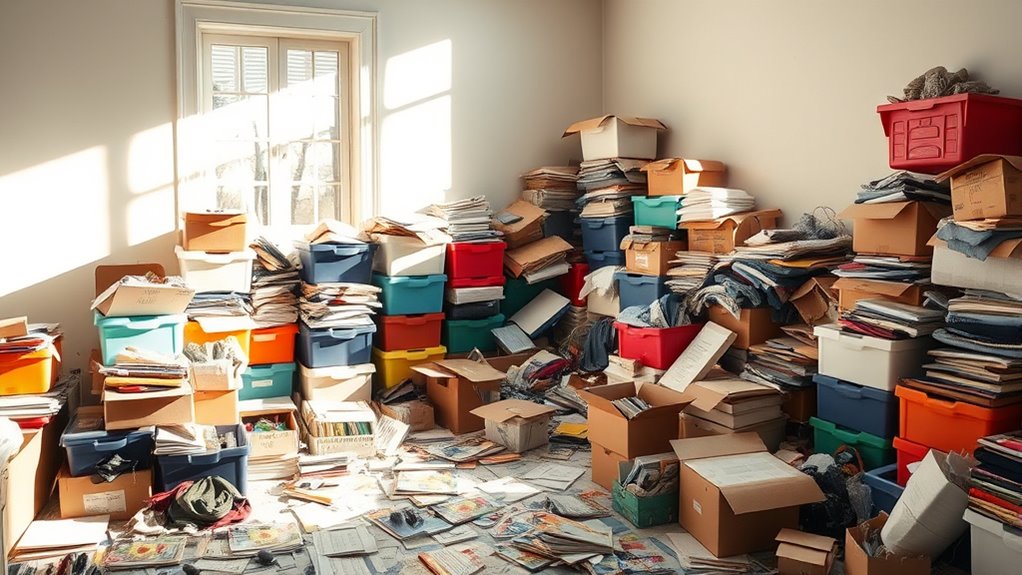
Although it might seem logical to organize your belongings before decluttering, doing so can lead to more clutter and frustration. Premature organization just moves items around rather than eliminating them. You might find yourself sorting through unused or broken items without deciding what to keep or discard, creating a bigger mess. To avoid this, focus on decluttering thoroughly first. Remove everything from a space and categorize items into "keep," "donate," "sell," and "discard" bins. Prioritize one area at a time to prevent overwhelm. This approach not only streamlines your decluttering process but also fosters mental clarity that can enhance your overall well-being. A clutter-free home can lead to a simpler, calmer life.
Ignoring Maintenance and Follow-Up

After successfully decluttering your space, it's easy to overlook the importance of ongoing maintenance and follow-up. Ignoring this step can lead to hidden issues like leaks, mold, or pest infestations, which may result in costly repairs later.
Overstuffed areas often conceal moisture buildup or rodent activity, so make sure to inspect hard-to-reach spots like attics and garages regularly. Removing clutter not only enhances safety by reducing trip hazards but also improves indoor air quality. Decluttering protects the home from costly repairs, allowing you to address issues before they escalate. Regular maintenance checks can be as essential as installing a home security system, ensuring that your home remains safe and sound.
Create a repair checklist during your decluttering sessions to ensure that you address maintenance concerns promptly. Scheduling regular checks on appliances and plumbing prevents minor problems from escalating, ultimately saving you time and money while maintaining a safe and organized home.
Failing to Set Specific Goals
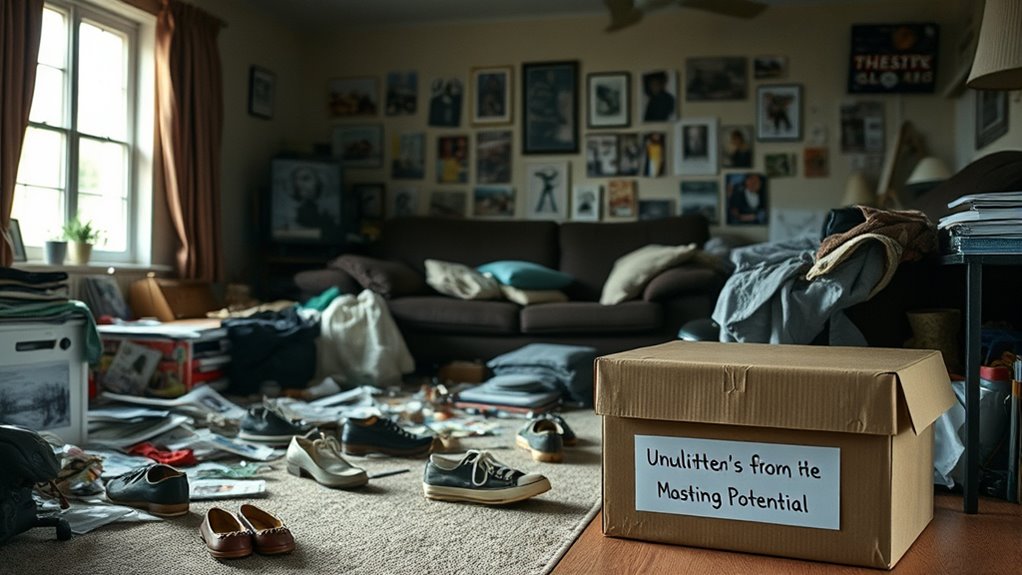
Setting specific goals is crucial for effective decluttering, as it provides the direction and purpose you need to tackle the task at hand. Without clear objectives, your efforts can feel aimless, leading to confusion and wasted time on unimportant tasks.
Vague goals make it tough to measure your progress, which can dampen your motivation. When you don't have specific targets, decluttering can seem overwhelming, pushing you toward procrastination.
Plus, the lack of clear outcomes can reduce your enthusiasm. By setting SMART goals—Specific, Measurable, Achievable, Relevant, and Time-bound—you'll create a focused path to success. This not only enhances your mental well-being but also gives you a sense of accomplishment as you see tangible results from your hard work, helping you create a clear roadmap for successful decluttering efforts.
Overlooking the Importance of Categorization

When you dive into decluttering, it's easy to overlook the significance of categorization, yet it can dramatically streamline your efforts. By grouping items by similarity, function, or user, you'll quickly see where excess clutter lies. This systematic approach not only makes the process more manageable but also offers a sense of accomplishment as you tackle one category at a time. The KonMari Method emphasizes starting with less emotionally charged categories, like household textiles or media, to build momentum. Avoid creating extensive subcategories or a large miscellaneous pile; it complicates your efforts. Regularly review your categories, ensuring they remain practical and easy to navigate. Embracing categorization can reveal your clutter's weak spots and help you maintain an organized space.
Neglecting to Create a Checklist

A checklist is essential for effective decluttering, yet many people neglect to create one.
Without it, your decluttering efforts might lack direction, leading to confusion and inefficiency. You may struggle to track your progress, which is crucial for staying motivated. This disorganization can increase stress and create inconsistent results in different areas of your home. By having a checklist, you can ensure that you improve overall home organization and maintain focus throughout the decluttering process.
Frequently Asked Questions
How Do I Decide What to Keep or Discard?
To decide what to keep or discard, start by assessing each item's usefulness and sentimental value.
If you haven't used it in a year, consider letting it go. Ask yourself if you'd repurchase the item, and evaluate duplicates critically.
Create clear criteria for retention based on practicality and joy.
What Are Some Effective Decluttering Strategies for Small Spaces?
To effectively declutter small spaces, start by using vertical storage like shelves that reach the ceiling.
Focus on hidden areas, such as under beds and closets, for extra storage.
Implement the "one in, one out" rule to maintain balance when acquiring new items.
Break decluttering into small sessions to avoid burnout, and create functional zones in multi-purpose rooms to keep things organized.
Regularly assess your progress to stay on track.
How Often Should I Declutter My Home?
How often do you find yourself overwhelmed by clutter? To keep your home organized, try daily decluttering for small tasks, like tidying up a kitchen counter.
Aim for weekly sessions in high-traffic areas, and schedule monthly deep cleans to maintain order.
Seasonal reviews can help manage specific items, while annual cleanouts tackle less-frequented spaces.
Can Decluttering Improve My Mental Health?
Yes, decluttering can significantly improve your mental health.
When you clear out excess clutter, you create a more organized and peaceful environment that reduces feelings of overwhelm and anxiety. A tidy space can boost your mood and self-esteem, making you feel more in control.
Plus, a clutter-free area enhances focus and productivity, leading to a greater sense of accomplishment.
What Should I Do With Items I Can't Decide About?
When you're faced with a mountain of muddled memories, it's time to tackle those tough-to-decide items.
Start by setting a short time limit for each piece, pushing past decision fatigue. Create a "maybe" pile for items that can wait, or use the 90/90 rule to assess their future usefulness.
Consider placing items in an outbox for later review, allowing you to clear clutter while keeping sentimental sentiments in check.
Conclusion
In conclusion, avoiding these decluttering mistakes can significantly boost your progress. Did you know that nearly 82% of people report feeling less stressed after decluttering their spaces? By creating a clear plan, setting specific goals, and maintaining your progress, you'll not only enjoy a tidier environment but also a calmer mind. So take a moment to reassess your approach and watch how your efforts transform your space—and your life!
